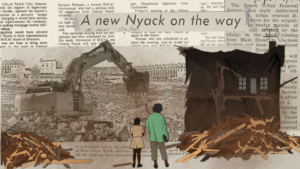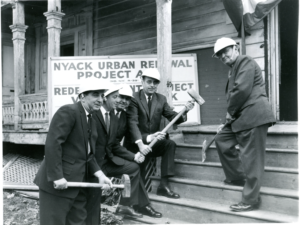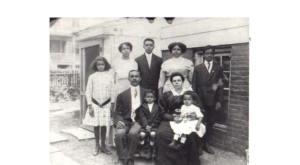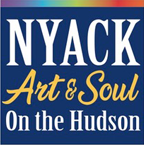
Photo Courtesy of the Nyack Library Local History Room
Under the Housing Act of 1949, billions of federal dollars were made available to local governments through grants and incentives for the purpose of urban “revitalization.” Nyack was just one of several thousand communities across the U.S. affected by this initiative in the 1960s and 1970s.
A new documentary, What Happened to Jackson Avenue, offers rare, real-life accounts of the human impact of urban renewal. Through interviews with people who experienced urban renewal first-hand, the film tells the story of how the intended revitalization ultimately resulted in the destruction of an entire community.
That community was set along Jackson Avenue, where 124 families, nearly 80% of them Black, lost their homes, businesses, and generations of accumulated wealth to ‘eminent domain.’

Photo Courtesy of the Nyack Library Local History Room
Inspiration for the documentary sprang from a comment made by local historian and activist Bill Batson in the summer of 2019 as he in stood in the main parking lot at the center of Nyack village. “This was Jackson Avenue. Our family home once stood here,” he said.
That spark set a creative process in motion—two-years of research, interviews, photography and editing undertaken by young filmmakers Hakima Alem and Rudi Gohl.
Panel discussions followed the 60-minute screenings and gave audiences opportunities to share reactions to the film, and hear live from storytellers interviewed in the film, as well as the documentary creators. Batson, who also appears in the film, served as moderator.
The film was produced by the Phoenix Theatre Ensemble – a NYC-grown theater company now with a home and annual live arts festival in Nyack. Screenings in June and July were presented in collaboration with Rivertown Film Society and The Nyack Center.

Avery Family at Jackson Avenue, 1920s (Photo Courtesy of the Avery Batson Family)
“This film is essential to an understanding of Nyack’s history, and provides an important case study of how even a small village was shaped by the broader forces driving urban renewal policies in the 1960s,” said Elijah Reichlin-Melnick, Former NY State senator.
“This is a powerful film, and a service to our community as it acknowledges and learns from its history,” commented Don Hammond, Mayor of Nyack.
You can view a trailer of the documentary here. Information about the storytellers and the documentary artists are below. Information about broader distribution of the film will be forthcoming.
ABOUT THE STORYTELLERS
Bill Batson is well known in the Nyack community as a leader, artist and historian. His grandmother’s family, the Avery’s, moved to Nyack in the late 1800s. They lived through, and spoke out against, urban renewal. His family home on Jackson Avenue was a casualty. Today, Batson is a columnist and featured contributor to Nyack News & Views, where his weekly Sketch Log chronicles the Nyack experience through words and art. Batson also manages the weekly Farmers Market for the Nyack Chamber of Commerce.
Faith Blount is a Nyack native who experienced urban renewal first-hand as a child. Her family lived with her grandparents in a house on Liberty street, with her grandfather’s dry cleaning business attached. Blount’s grandfather was a civil rights leader and founder of the NAACP chapter in Nyack. In the wake of urban renewal, the Blounts received some compensation for the residence but not for the business, which was their livelihood. Blount is a pharmacist and a role model for young Black people wherever she goes.
Lonnie “Buster” Leonard is a Nyack native who grew up on Jackson Avenue in the 1950s. He experienced urban renewal as a teenager when he lost his home and saw his friends and community forced out. His family moved to High Avenue just before the demolition began. Their old home on Jackson Avenue was destroyed shortly thereafter.
Win Perry is a historian and architect who comes from a long line of Nyack locals. He currently resides in the house his family built in 1846. His grandson is the 12th generation of his family to live in Nyack. Perry worked for an architectural firm in Nyack during urban renewal and saw both sides of the process. Past president of the local historical society, Perry is currently a member of the executive board. He was a member of the NAACP and has served as an educator on urban renewal and city planning.
Barbara Williams was born in Anniston, Alabama and moved to Nyack in the early 1960s. She was an avid member of the protests against the urban renewal project. In 1965, she managed the campaign that won Hezekiah Easter a seat on the Village of Nyack Board of Trustees—the first Black person elected to public office in Rockland County. Williams was inducted into Rockland County’s Civil Rights Hall of Fame in 2016 for her work in fighting discrimination against disadvantaged people and people of color. She describes herself as a storyteller, memory keeper and “ancestor in training.”
ABOUT THE ARTISTS
Hakima Alem is an Ethiopian writer and film director. She moved to Nyack in 2018, and now resides in New York City. Alem graduated from Bard College in 2021. Her work centers on the lives of women of color, human rights and international adoption. Her credits include documentary films and work with multiple nonprofits. Before directing What Happened To Jackson Avenue, she was an assistant editor for the film Muicha, The Voice of Bossa Nova and created her own film titled Black at Bard 2020.
Rudi Gohl is a filmmaker based in New York City. Since completing college in 2021, Gohl has worked extensively in New York, filming and editing music videos, short films, plays and documentaries. With the documentary format as his primary focus, Gohl has recently worked with the musical artist Chandrika Tandon, and multi-cultural artist Eljuri. He currently holds a position as junior assistant editor and post-production assistant for the award-winning documentary company Show of Force.
Teese Gohl (music) is a Swiss musical producer/director/supervisor/composer of film scores and stage productions. He produced most of Elliot Goldenthal’s film scores as well as others. Two scores that he has produced have won Oscars — Elliot Goldenthal’s Frida and John Corigliano’s The Red Violin.




